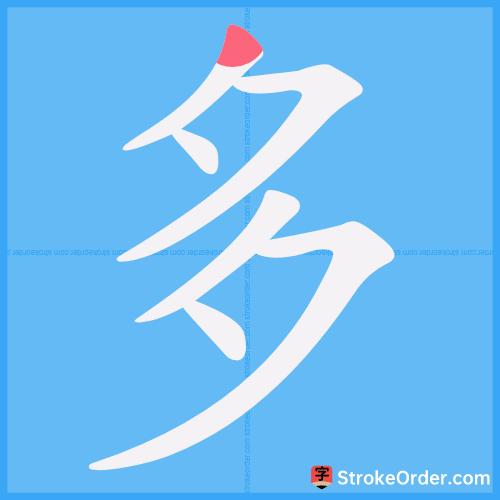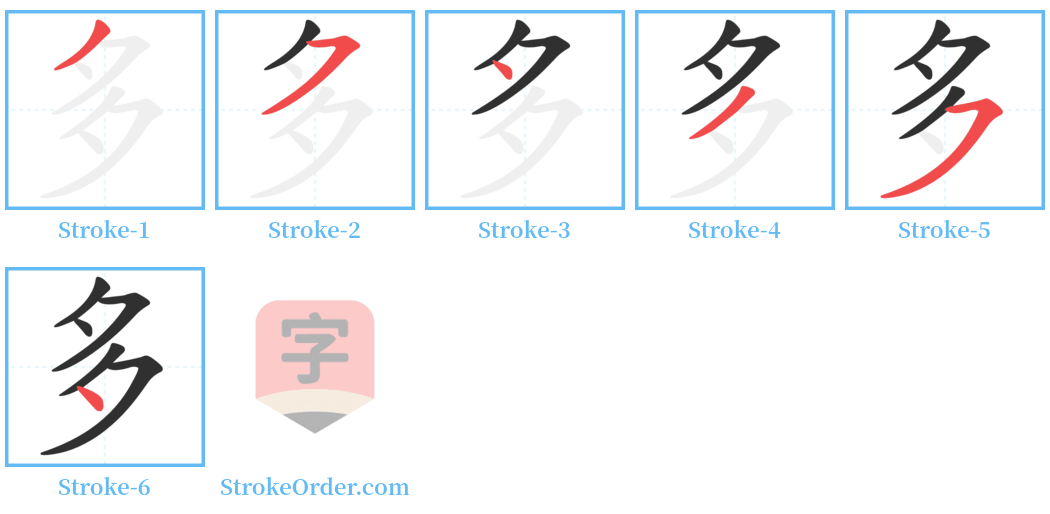多 Stroke Order
Animated Stroke Order of 多

Stroke Order Diagrams for 多

Step-by-Step Handwriting Guide for 多

Learn to Write Chinese Characters with Video Tutorials
Watch the video of writing the Chinese character "多", learn the correct stroke order (笔顺) of the character "多", and master the standard way of writing the character "多".
Free Printable Handwriting Practice with Stroke Order: 多
Printable Writing Practice Worksheet of "多" in Portrait Orientation (Tian Zi Ge)

Printable Writing Practice Worksheet of "多" in Landscape Orientation (Tian Zi Ge)

Information of 多
Pinyin
duō
Radical
夕
Strokes
6 strokes
Usage
★★★★★
Definition
many / much / a lot of / numerous / multi-
多 [duō]
Meaning:
1. Quantity is large, opposite to "少" (few) and "寡" (scarce):
人多。 (Many people.)
多年。 (Many years.)
多姿。 (Many forms.)
多层次。 (Many levels.)
多角度。 (Many angles.)
多难兴邦。 (Too many difficulties hinder national prosperity.)
多行不义必自毙。 (Those who do many wrongs will inevitably perish.)
2. Number is more than two:
多年生草。 (Many years of grass.)
多项式。 (Many terms in a polynomial.)
多义词。 (Many synonyms.)
多元论。 (Pluralism.)
3. More than a certain number; excess:
多余。 (Excess.)
一年多。 (More than a year.)
4. Excessive, unnecessary:
多嘴。 (Talk too much.)
多心。 (Overthinking.)
多此一举。 (Unnecessary action.)
5. Degree of difference is large:
好得多。 (Much better.)
6. Indicates astonishment or admiration:
多好。 (How good!)
7. Indicates a certain degree:
有多大劲儿使多大劲儿。 (Use as much force as possible.)
8. Indicates a question:
有多大呢? (How big is it?)
多会儿? (How long?)
9. A surname.
Other meanings:
1. Same as the basic meaning (many; much; more).
2. Exceeds the correct or needed quantity; too many; too much.
3. Heavy, as opposed to "轻" (light).
4. Worthy; good.
5. (Numerical term)used after a number to indicate the remainder or fraction below the integer (odd).
6. (Difference) Degree is large (much more).
7. Approval or admiration (praise).
8. A surname.
副词 (Adverb):
1. How (多么).
2. Used in interrogative sentences to inquire about quantity.
3. Used in exclamatory sentences to indicate a high degree.
4. Indicating a certain degree without specificity.
5. Only (只, 仅仅).
6. Mostly (大多).
Example phrases:
多钱一斤? (How much per pound?)
多早? (What time?)
你看人家做得多好! (Look how well they did!)
Dorgon (1612-1651), fourteenth son of Nurhaci 努爾哈赤|努尔哈赤, successful general, instrumental in Manchu conquest of China, ruled China as regent 1644-1650 for his nephew Emperor Shunzhi 順治帝
Input Method for 多
Pinyin
duo1
Wubi
qqu
Cangjie
nini
Zhengma
rsrs
Four Corner
27207
Unicode
U+591a
Same Pronunciation Characters